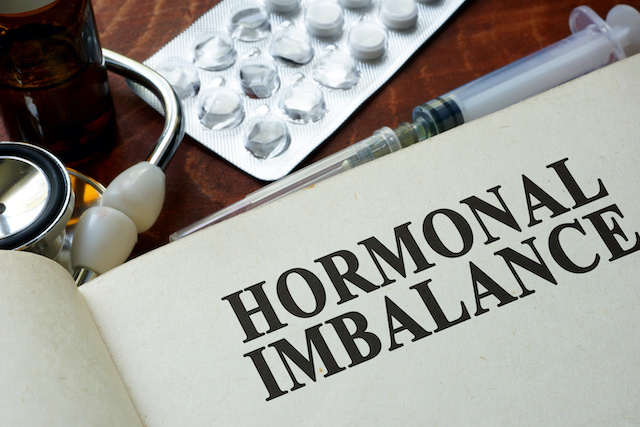Learn the facts on hormones, weight gain, belly fat and hormonal imbalances
Whatever your age, hormones play a big factor in your health, wellness, mood, and weight. Yes, you read that correctly. Hormones play a huge part in your ability to lose weight, to stay healthy, and to feel like yourself.
So many of you have contacted me with your questions about hormonal imbalances affecting weight gain, insulin and belly fat, and how to overcome a hormonal imbalance. I decided the best way to help you and share what I know about hormones as it pertains to your health is with this hormone FAQ.
Along with this hormone FAQ, make sure you subscribe to my mailing list to get my insider tips and advice on how to maintain good overall health and achieve a slim, curvy body. Join the JJ Smith Facebook Community page to connect and chat with other people, who like you, are taking charge of their health.
You can also use Hormone Focus to naturally support hormonal balance. Hormone Focus supports healthy estrogen levels and helps get rid of stubborn fat around the belly, thighs and arms caused by hormonal imbalances. It also relieves hormonal symptoms such as night sweats, mood swings, fatigue, water retention and poor sleep to help you improve your energy and vitality.
What are hormones?
Hormones are specialized chemical substances in the body, controlling and regulating the activities of other cells and organs. Your body relies on hormones and the messages they send to regulate every process in your body including appetite, heart rate, sleep cycles, reproductive cycles, sexual function, metabolism, mood, and body temperature.
Men and women have the same hormones, but the amount, how they are produced, and how they interact with other organs and body systems is different.
While the human body creates and circulates 50 different hormone types, most people think of these five hormones when asking about hormones and their health:
- Thyroid hormones: help regulate your metabolism, weight, energy levels, internal body temperature, and the health of your skin and hair.
- Insulin: is secreted by the pancreas and processes the glucose and sugar in foods you eat for energy. When your insulin level is too high, sugar and glucose are stored as fat.
- Estrogen: both men and women have estrogen, but it is much higher in women. Along with being responsible for reproduction, menstruation, and menopause, your estrogen levels have a direct connection with your body fat levels.
- Testosterone: is the male sex hormone, though women also have testosterone. Testosterone is also responsible for building strong bones and muscles.
- Cortisol: often referred to as the stress hormone, cortisol helps you feel energetic and healthy. This hormone is responsible for helping you respond to and manage physical and mental stress.
What is hormonal imbalance?
A hormonal imbalance happens when there is too little or too much of a hormone circulating in your blood. All it takes is a small fluctuation in a hormone level to trigger a range of side effects and symptoms in your body.
According to Medical News Today, hormonal imbalances impact both men and women. “Men and women alike can be affected by imbalances in insulin, steroids, growth hormones, and adrenaline. Women may also experience imbalances in estrogen and progesterone levels, while men are more likely to experience imbalances in testosterone levels.”
A hormonal imbalance can be the cause of a range of problems including itchy skin, weight gain, low energy levels, and fluctuating moods.
What are the signs symptoms of hormone imbalance?
Because hormones are integral to every aspect of your health and well-being, it’s very easy to overlook the signs and symptoms of a hormone imbalance. You may for example, blame your low mood on stress at work, dry skin on the changing seasons, or attribute extra belly fat to lack of exercise. When in reality, a hormonal imbalance is causing you to store extra belly fat, have itchy skin, or to not feel like yourself.
It’s super important to know the signs and symptoms of a hormone imbalance so you can get on top of the problem and return to feeling and looking fantastic. Because hormones are essential to every function in your body, there are numerous signs and symptoms of a hormonal imbalance.
I want you to be aware of these 10 signs and symptoms of a hormone imbalance, but do not overlook any new or unexplained symptoms:
- Fatigue and low energy levels.
- Weight gain, even though you’re eating well and exercising.
- Difficulties sleeping or night sweats.
- Mood swings, low mood, or depression.
- Fluctuating body temperature, including hot flashes.
- Dry skin and brittle hair.
- Increased appetite.
- Changes in your sex drive.
- Heavy, irregular, or missed periods.
- Loss of muscle strength, aches, or soreness.
If you are experiencing any of these hormone imbalance signs and symptoms or any other new symptoms, please talk to your doctor – these can be linked to serious underlying conditions which must be addressed
What causes a hormonal imbalance?
Just like the signs and symptoms of a hormonal imbalance, there are numerous causes for a hormonal imbalance. I have highlighted some of the causes of a hormonal imbalance attributed to lifestyle habits.
- Diabetes
- Stress
- Poor diet and nutrition
- Alcohol consumption
- Smoking
- Lack of sleep
- what is dextoxing
- Obesity
To see a detailed list of the causes of a hormonal imbalance, including those connected to underlying health conditions, read Everything You Should Know About Hormonal Imbalance.
Which hormones are linked to weight gain and belly fat?
Usually when we think about losing weight and getting rid of extra belly fat, we focus on diet, exercise, and detoxing the liver. However, regulation of key hormones are essential to helping you lose weight, maintaining a healthy weight, and losing extra belly fat.
These five hormones are directly linked to weight gain, belly fat, and a slow metabolism:
- Thyroid hormones control your ability to burn calories and convert food into energy. When your thyroid hormones are low, your metabolism slows down, causing weight gain and low energy levels.
- Leptin is your hunger signal or appetite hormone. This hormone tells you when you’re full and should stop eating. However, when you consume too many high sugar or high carbohydrate foods, your body ends up storing the extra sugar and carbohydrates as fat. This extra fat creates additional leptin, causing your brain to get confused and ignore signals to stop eating.
- Insulin is responsible for converting sugar and glucose from food into energy. When you consume processed food and foods high in carbohydrates or sugar, a trickle-down effect occurs causing high blood sugar levels and eventually insulin resistance. Insulin resistance causes a range of health problems including fatty liver disease and an accumulation of belly fat.
- Cortisol is a steroid hormone secreted by your adrenal glands when you’re under stress, injured, nervous, or depressed. Too much cortisol can cause insulin resistance, an increase in appetite, and trigger cravings for sugary, salty, and high-fat foods. All of this adds up to weight gain particularly around your belly.
- Estrogen levels, either too high or too low are directly connected with your weight, metabolism, and ability produce insulin. High estrogen levels can cause problems with the cells that create insulin, causing you to gain weight (even if you aren’t eating high-carbohydrate or sugar foods). During perimenopause and menopause, your body produces less estrogen, causing confusion in your body. Your body reacts by looking for estrogen sources, and one popular source is fat. This need for estrogen and fat, kick starts a chain of responses, ultimately resulting in extra weight gain around the belly and lower body.
How to reset your hormones and metabolism?
Before I highlight how to naturally and safely reset your hormones and metabolism, I want to remind you to never overlook the symptoms of hormonal imbalance. These symptoms can indicate a serious health problem.
Your overall health is your top priority. So please talk to your doctor if you’re experiencing any unexplained symptoms such as weight gain, fluctuating moods, low energy levels, or changes in your period.
When you know your hormonal imbalances are caused by lifestyle habits or body changes attributed to age, you can safely and naturally reset your hormones to kickstart your metabolism with these five tips:
- Focus on eating fruits, vegetables, whole grains, lean protein, and healthy fats. Remember you are what you eat, and every organ and cell in your body is relying on you to provide the vitamins, minerals, and energy required to keep you healthy. Read about the top liver superfoods and the connection between food and your health.
- You can also use Hormone Focus to naturally support hormonal balance. Hormone Focus supports healthy estrogen levels and helps get rid of stubborn fat around the belly, thighs and arms caused by hormonal imbalances. It also relieves hormonal symptoms such as night sweats, mood swings, fatigue, water retention and poor sleep to help you improve your energy and vitality.
- Give your liver the support it needs to function properly. When your liver is overloaded, it cannot metabolize carbohydrates and fat properly, causing your body to store this energy as fat. Take a natural liver supplement like Liver Focus to improve your body’s ability to detoxify and to naturally improve your fat-burning capabilities.
- Get enough sleep and rest. Your body needs you to sleep at least eight hours a night, so it has a chance to rebuild and recover from the stress of the day. When you sleep, your body repairs any damages to cells, strengthens your immune system, and rebuilds your energy levels.
- Take control of your stress. Too much stress causes your cortisol hormones to increase, makes it difficult to sleep, changes your mood, and causes emotional eating. Pay attention to when and why you’re stressed and make small changes in your day to better manage this stress. Teach yourself to say “no” when your calendar is full or you’re feeling overwhelmed.
I hope this hormone FAQ answers your questions about how your hormones impact your overall health, well-being, mood, and weight.
If you want to learn more about how I took control of my hormonal health, read my book Lose Weight Without Dieting or Working Out and watch my video where I talk about hormones, insulin, and your weight.


